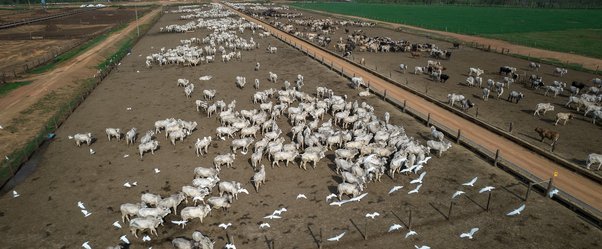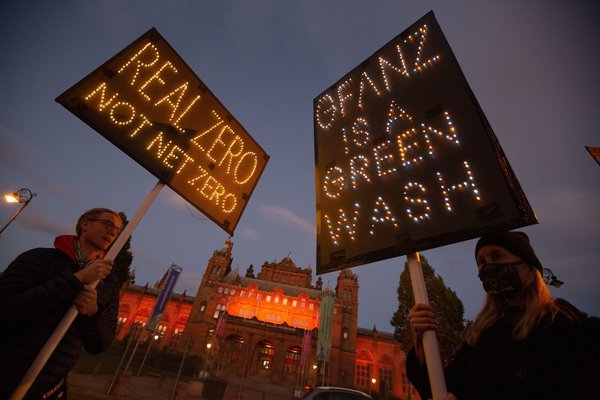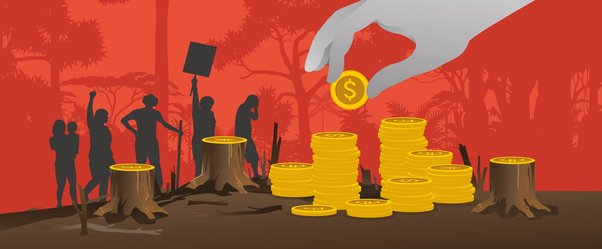Big name members of the “GFANZ” alliance like Blackrock have increased investments in forest-risk commodities since last year’s COP26
Asset management firms that signed onto the Glasgow Financial Alliance for Net Zero (GFANZ) in the lead up to COP26 are failing to significantly reduce their investments in companies working in sectors widely linked with deforestation, new analysis from Global Witness reveals.
More than a year on from the launch of GFANZ, the analysis finds that there has only been a three percent reduction by its members in investments that are at risk of contributing to the clearing of the world's climate critical forests. 360 asset managers participating in the alliance continue to hold such investments worth a combined $8.5 billion - almost matching the $9 billion sum President Biden has pledged to fight deforestation.
This includes the likes of financial giants BlackRock, Vanguard, and Deutsche Bank, all of whom have continued to invest in agri-business companies that stand accused of mass-scale deforestation such as the Brazilian meatpacker JBS. In fact, GFANZ members have acquired an additional 10 million shares in JBS since COP26, with Vanguard alone increasing investments in JBS by an estimated $12.4 million.
In September, GFANZ leaders including Former Governor of the Bank of England Mark Carney wrote to members urging them to stop financing deforestation, warning ‘the world will not reach net zero by 2050 unless we halt and reverse deforestation within a decade’. Net zero targets are unreachable while GFANZ members keep financing deforestation – currently responsible for around 11% of global emissions and driven largely by agriculture.
Veronica Oakeshott, Forests Campaign Leader at Global Witness, said:
“Despite the huge fanfare around GFANZ, its members’ efforts on deforestation as a whole are woefully inadequate. Protecting forests is essential to tackling the climate crisis, as GFANZ itself recognises. A year on from COP26, GFANZ membership is at risk of becoming little more than a badge to be worn by banks and financiers, who continue to plough money into practices that are destroying our forests.
"The recent decision by GFANZ to walk away from Race to Zero and its independently-set targets, including ambitious pledges on deforestation, right at the moment that members might be chucked out for not meeting them, tells you everything you need to know about member intentions. Sadly, the private sector is proving it is unwilling to cut off the money pipeline to deforestation on its own accord. This has to change and it will take new laws to make it happen.
“Those suffering from climate induced events like the floods in Pakistan or droughts and wildfires in Europe, as well as future generations, are being let down by GFANZ companies. If we want any forests left standing, and to have any prospect of avoiding catastrophic climate change, governments must introduce legislation that stops investors contributing to the destruction of rainforests."
In addition to increased investments in JBS, Global Witness found that investments by GFANZ members in other controversial agribusinesses have gone up since last year, including Astra Argo Lestari (from $21 million to $28 million), SLC Agricola (from $59 million to $72 million and Wilmar International (from $213 million to $229 million), all of which have been linked to deforestation.
Last year, Global Witness revealed that financial institutions made deals worth $157 billion with firms accused of destroying tropical forest in Brazil, Southeast Asia and Africa since the Paris Climate Agreement in 2015.
Launched on ‘Finance day’ at COP27 and a day after Antonio Guterres, UN Secretary General, said “we must have zero tolerance for net-zero greenwashing”, during the publication of a report into the issue by his expert group.
Oakeshott added:
“The UN Secretary General has quite rightly lost patience with greenwashing companies that sign up to net-zero but carry on with the same destructive practices as before. Our research shows this is not only a problem with regard to fossil fuel investments but also exposure to deforestation risk. It is not surprising that Mr Guterres, and his group of advisers, are increasingly looking to legislation to hold companies to account.”
Global Witness is calling on governments in key financial centres to introduce legislation requiring investors to ensure their portfolios are not contributing to rainforest destruction.
Notes to editor:
Veronica Oakeshott will be available for interview from COP27 in Sharm El-Sheikh


